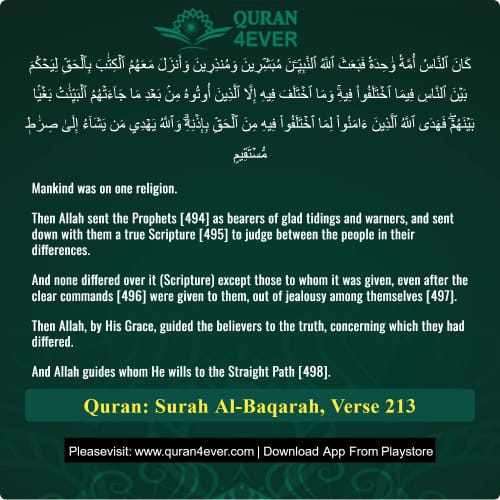
Transliteration:( Kaanan naasu ummatanw waahidatan fab'asal laahun Nabiyyeena mubashshireena wa munzireena wa anzala ma'ahumul kitaaba bilhaqqi liyahkuma bainan naasi feemakh talafoo feeh; wa makh talafa feehi 'illallazeena ootoohu mim ba'di maa jaaa'athumul baiyinaatu baghyam bainahum fahadal laahul lazeena aamanoo limakh talafoo feehi minal haqqi bi iznih; wallaahu yahdee mai yashaaa'u ilaa Siraatim Mustaqeem )
213. Mankind was on one religion. Then Allah sent the Prophets [494] as bearers of glad tidings and warners, and sent down with them a true Scripture [495] to judge between the people in their differences. And none differed over it (Scripture) except those to whom it was given, even after the clear commands [496] were given to them, out of jealousy among themselves [497]. Then Allah, by His Grace, guided the believers to the truth, concerning which they had differed. And Allah guides whom He wills to the Straight Path. [498]
Hazrat Imam Hassan (RA) explains that there came a time when Prophetic light had vanished, and mankind had fallen into disbelief.
🔹 Out of Allah’s mercy, He sent Prophets to guide humanity.
🔹 Alternatively, it can refer to the time between Hazrat Adam and Hazrat Nuh, when people were united in faith, but beliefs later diverged, necessitating Prophetic guidance.
This verse teaches that unity based on error, sin, or disbelief is not praiseworthy and must be broken.
🔹 Only order founded on truth and discipline is worth preserving.
The phrase “with them” implies that not every Prophet received a new Book.
🔹 Some delivered earlier scriptures.
🔹 Only four major Books were revealed: Torah, Zabur, Injeel, and Qur’an, while the total scrolls were 110.
🔹 For example: Hazrat Adam received 10, Sheeth 50, Idrees 10, Musa 10, and Ibrahim 10.
It was often the learned and elite—not the uneducated—who rejected Prophets, fearing a loss of authority and status.
🔹 This verse comforts the Prophet ﷺ that hostility from the learned Yahud is not new—they treated earlier Prophets the same.
Those who argue and divide over the truth are usually on falsehood.
🔹 True scholars do not spread discord.
🔹 Divine guidance turns knowledge into unity, while worldly knowledge without faith leads to division and even heresy, as seen in the example of Shaytan: “Allah led him astray despite his knowledge.” (S45:V23)
This verse clarifies that true guidance is a matter of Allah’s grace.
🔹 It is not based on lineage, race, knowledge, or status.
🔹 Only Allah guides whom He wills to the Straight Path, beyond human effort or heritage.
The tafsir of Surah Baqarah verse 212 by Ibn Kathir is unavailable here.
Please refer to Surah Baqarah ayat 211 which provides the complete commentary from verse 211 through 212.
(2:213) In the beginning mankind followed one single way. (Later on this state ended and differences arose.) Then Allah sent forth Prophets as heralds of good tidings for the righteous and as warners against the consequences of evil-doing. He sent down with them the Book embodying the Truth so that it might judge among people in their disputes. And those who innovated divergent ways rather than follow the Truth were none other than those who had received the knowledge of the Truth and clear guidance; and they did so to commit excesses against each other.[230] So by His leave Allah directed the believers to the Right Way in matters on which they disagreed. Allah guides whomsoever He wills onto a Straight Way.
230. When ignorant people attempt to trace the history of ‘religion’ they tend to the view that man began his life in the darkness of polytheisrn and that in the course of time, corresponding to man’s progress, this darkness gradually receded and light increased till man arrived at monotheism.
The Qur’anic version, however, proclaims that man began his life in full light of the Truth. God revealed this Truth to the very first man He created, one to whom He intimated the right way of life for man. Thereafter the human race remained on the Right Way for some time and lived as one community. Later, however, people invented deviating ways. This did not happen because Truth had not been communicated to them. The cause was rather that some people wilfully sought to acquire privileges, benefits and advantages beyond their legitimate limits, and thus subjected others to injustices. It was in order to enable people to overcome this corruption that God sent His Prophets. These Prophets were not sent to found separate religions in their own names and bring new religious communities into existence. Rather the purpose of the Prophets was to illuminate before people the Truth which they had allowed to be lost, and once again make them into one community.

For a faster and smoother experience,
install our mobile app now.
Related Ayat(Verses)/Topics